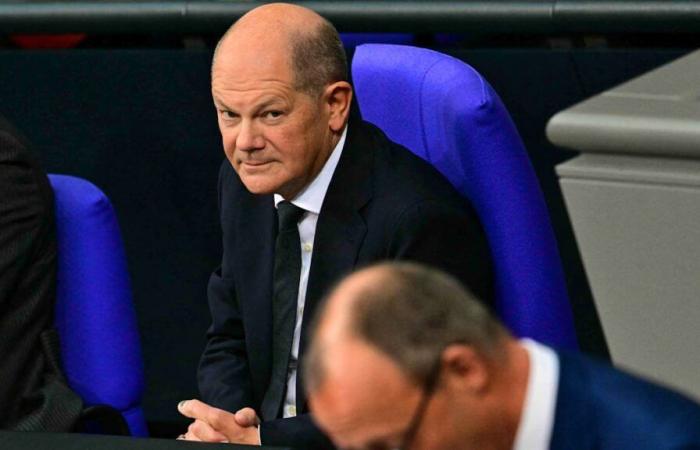Olaf Scholz listening to his CDU rival speak in parliament in early November.
Tobias Schwarz/AFP
Through a meeting, the unpopular chancellor and the leader of the conservatives Friedrich Merz, favorite in the polls to succeed him, opposed three months of early legislative elections. Olaf Scholz, whose heterogeneous coalition with the ecologists and the Liberals broke up at the beginning of November, castigated the warlike attitude of his rival towards Russia.
He is seeking to rise in the polls by now positioning himself as chancellor of peace and supporter of restraint, while the conservatives advocate increased aid to Ukraine.
Ukraine
In front of hundreds of members of the Social Democratic Party (SPD) in Berlin, Olaf Scholz promised to keep a “cool head” on the subject of the war between Russia and Ukraine, denouncing the hawkish overtones of his opponent. “Be careful, we don’t play Russian roulette with Germany’s security,” he said.
Friedrich Merz is in favor under certain conditions of a delivery of German Taurus missiles to kyiv, making it possible to strike deep into Russian territory. A red line for Olaf Scholz, who opposes his American, French and British allies on this point, in a pacifist country crossed by a significant pro-Russian current of opinion.
Rather than “issue an ultimatum to a country with a nuclear army, Olaf Scholz wants to conduct “real negotiations” with Russia and Ukraine, without whom “nothing can be decided”. Under his mandate, Germany became the second largest arms supplier to Ukraine, but at the cost of much hesitation.
Industry
From his constituency of Schmallenberg, in western Germany, Friedrich Merz promised “fundamental change” for the German economy, close to a second consecutive annual recession and weighed down by a serious industrial crisis. The leader of Angela Merkel’s party ‘is caught in the “green interventionism in every area of life, every business, every sector of activity” of the Greens and the SPD.
Two glaring examples according to him: subsidies for heat pumps and electric cars. “The State must no longer define how we heat ourselves, we drive, and we eat,” continued the former business lawyer.
For Olaf Scholz, the CDU has “always the same recipe”, made up of tax cuts for businesses. “It reminds me of a doctor who always prescribes the same pills to his patients, whether they have a cough or a broken foot.” To solve the country’s ills, the chancellor instead wants to tackle underinvestment in Germany’s aging infrastructure.
On Saturday, he proposed to reimburse 10% taxes on sums invested by companies in the country as well as to relax national constitutional constraints limiting public deficits. As for purchasing power, the social democrat recommends increasing the minimum wage from 12.41 to 15 euros per hour, tax breaks for 95% of workers and a tax increase for the top 1%. well-off. For Scholz, the current conservatives “no longer have anything to do with Angela Merkel’s centrist CDU” and have become right-wing.
Immigration
The two leaders also discussed illegal immigration, on which the far-right Alternative for Germany party thrives, given second place in voting intentions at 18%, behind the conservatives at around 33% and the social democrats. around 15%.
The head of the conservatives promised to “do everything to further reduce illegal immigration in Germany”, still bruised by an attack in Solingen at the end of August, committed by a Syrian in an irregular situation and claimed by the EI group. He also recommends pushing back migrants at Germany’s borders, otherwise “we will not solve this problem.”
For Olaf Scholz, his rival does not accept “the reality”, namely that “Germany has long been a country of immigration”, with a quarter of the population having foreign origins.
(AFP)






